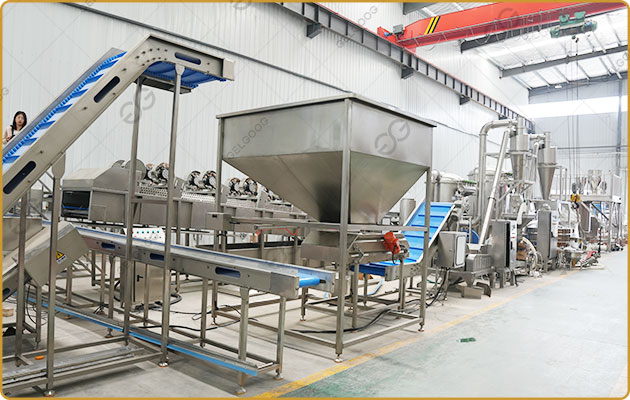Plantains are one of Nigeria staple’s foods, with Nigerians consuming large quantities of plantains annually. Plantain chips, as a snack derived from plantains, are widely loved for their crispy texture and rich flavor. Whether for snacking or as a side dish, plantain chips have a broad consumer base. Additionally, with the acceleration of modern lifestyles, people are increasingly inclined to purchase convenient and ready-to-eat snacks. Plantain chips perfectly meet this demand, with their market demand showing a steady upward trend.
Cost Advantage
Nigeria boasts abundant plantain resources, with plantains being relatively inexpensive. This provides the plantain chips business with a significant cost advantage in raw materials. Apart from the cost of raw materials, the production process of plantain chips is relatively simple, primarily involving washing, slicing, frying, and seasoning. Compared to other food processing industries, the equipment and technology required are not overly complex, resulting in lower initial investment costs. Furthermore, Nigeria’s labor costs are relatively low, which helps reduce production expenses and enhance profit margins.
Diverse Sales Channels
In addition to traditional sales channels such as supermarkets, grocery stores, and roadside stalls, the rise of e-commerce platforms has opened up new avenues for selling plantain chips. Entrepreneurs can leverage online platforms to expand their sales reach, increase product visibility, and boost sales. Additionally, Nigeria’s vibrant food culture and frequent social gatherings provide ample opportunities for promoting and selling plantain chips. For instance, at parties and celebrations, plantain chips can be sold as party snacks, catering to consumers’ needs for entertainment and social settings.
High Profit Margins
Plantain chips are typically priced affordably, ranging from a few hundred naira to a few thousand naira per pack, making them accessible to consumers across different income levels. Despite the low price, the profit margin remains relatively high. According to industry estimates, the profit margin for plantain chips can reach 30%-50%. By optimizing production processes, reducing costs, and expanding sales channels, entrepreneurs can further increase their profits.
Policy Support and Industry Development Trends
The Nigerian government places significant emphasis on agricultural development, introducing a range of policies to support agricultural processing industries. The plantain chips business, as part of the agricultural processing sector, can benefit from these policy incentives, such as tax breaks and financial subsidies. These measures help reduce operational costs and enhance profitability. In recent years, Nigeria’s food processing industry has shown rapid growth, with the plantain chips sector gaining attention as a niche market. As consumer demand for healthy and convenient foods continues to rise, the plantain chips business is poised for even greater opportunities.
Challenges to Consider
The plantain chips market is competitive. Entrepreneurs must continuously improve product quality and develop unique flavors to stand out. Additionally, food safety and quality control are critical. Strict adherence to production standards and quality regulations is essential to establish a positive brand image. Another challenge lies in supply chain management. Ensuring a stable supply of raw materials and optimizing logistics and distribution processes are vital for meeting market demand.

In conclusion, the plantain chips business in Nigeria is highly
profitable. Entrepreneurs entering this market should conduct thorough research on consumer preferences and market trends, focus on product quality and innovation, expand sales channels, and strengthen brand building. By doing so, they can capture a significant share of the market and achieve success in the plantain chips business. At the same time, they can contribute to Nigeria’s agricultural development and food industry growth.
We are a manufacturer and supplier specializing in banana chip processing equipment. With more than 10 years of industry experience, we can provide you with a complete production line solution from slicing, frying to packaging. Our equipment is made of 304 stainless steel, supports a variety of heating methods such as electric heating and gas heating, and is equipped with an intelligent temperature control system to ensure stable product quality and energy-saving and high efficiency. According to different production capacity requirements, fully automatic (1000kg/h) or semi-automatic (100-500kg/h) production lines can be customized to meet the needs of small-scale entrepreneurship or large-scale production. In addition, we have successfully served international markets such as Africa and Southeast Asia. Welcome to consult for free quotes and technical solutions!